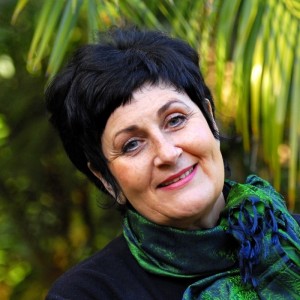Africa Scene: An Interview with Karin Brynard
Joanne Hichens chats to Karin Brynard, journalist, political correspondent, and award-winning author of the University of Johannesburg Debut Prize and Two M-Net Awards. Here, she answers questions about WEEPING WATERS, the translation of her debut Afrikaans novel, PLAASMOORD. This richly textured and complex crime novel begins with Sara returning to the family farm in the Kalahari, after her sister, the prophetic and talented artist, Freddie, is murdered. Sara, an astute journalist, soon discovers that underlying the crime is a complex web of lies and deceit.
Let’s kick off with a few questions around this concept of ‘Farm Murder’, which seems specifically a South African phenomenon. Can you comment on farm murder in general? It seems the ‘nostalgic’ story of the ‘African farm’ has been turned on its head by the horrific crimes that take place on SA farms.
When I started writing the book, there was a new wave of media interest in the phenomenon of ‘farm attacks’, which triggered the itch in the political journalist side of me. Growing up in a rural community in the Northern Cape where my father worked at a farmers’ co-op, I was very interested in this issue. I was thinking of the vulnerability of people living on a farm, far away from help—a local police station or even the next-door neighbour. At the time the newspapers were full of the brutality of some of these attacks, of the torture that was often involved, the high numbers and indiscriminate way both black and white became victims.
I was trying to ‘understand’ it myself, or at least get a grip on the facts. There was (and still is) a volatile public debate about it. Officially the police don’t view it as ‘special and different’ from other crime, while some white political groups go so far as to label it ‘genocide’.
Farming on this continent and specifically in southern Africa has never been ‘simple’ and uncomplicated, because it carries a lot of historical and political baggage. There’s a lot of emotion and political drama involved.
So where did you start?
I was always aware of the fact that this was a crime novel in the first place. And the first commandment of the crime novel is that it should be entertaining and have enough suspense and pace to keep you turning the pages. It could never be a political or historical lecture. Never.
And of course the characters are the fundamental draw. I really wanted to write a murder mystery revolving around the broken relationship between two sisters. The idea for this story came from a real life disagreement between my older sister and me. I wanted to satisfy both the political journalist in me, and the debut novelist trying to make sense of the intricacies of troubled family relationships. But one of the sisters, for my purposes, had to be dead.
Is this when you decided on the farm murder as ‘a way of killing’, so to speak?
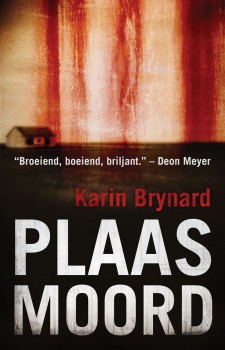 We all have visions of the farm as a safe place where people lead simple lives close to nature and to each other. We imagine scenes of healthy, fat cattle drowsily chewing grass or leisurely walking back to the kraal against vivid sunsets. Life revolves around the whims of nature and fate is in the hands of the gods. It is a place of peace and tranquility, of innocence and the goodness that flows from rearing animals and cultivating food.
We all have visions of the farm as a safe place where people lead simple lives close to nature and to each other. We imagine scenes of healthy, fat cattle drowsily chewing grass or leisurely walking back to the kraal against vivid sunsets. Life revolves around the whims of nature and fate is in the hands of the gods. It is a place of peace and tranquility, of innocence and the goodness that flows from rearing animals and cultivating food.
For this reason people are so horrified by the specter of violent and often brutal death in this setting. It shatters that nostalgic and often unrealistic image we have of ‘the simple life’.
All of that I tried to use as elements to enhance the suspense, to deepen the mystery and create more conflict. Sara discovers that in the two years leading up to Freddie’s death, Freddie had become a different person. In her efforts to find out more about Freddie and to make amends, she starts to doubt the assumption that this was a ‘typical’ farm murder.
Tell us a little more of how the mystery unfolds…
Without giving too much away, I can say this: Inspector Albertus Quartus Beeslaar, the newly-appointed detective who has asked for a transfer from the chaos and crime of Johannesburg to a quiet, rural post in the deep platteland, is suddenly confronted by more than one farm murder. Prior to the killing of Freddie and her adopted daughter Klara, two farm workers on a neighbouring farm are murdered. These murders are attributed to a sophisticated and most brutal gang of stock thieves terrorizing the area. There is considerable pressure from both Inspector Beeslaar’s bosses and the farming community to stop the thefts. The pressure is heightened in the aftermath of the murders on Freddie and her adopted daughter.
Your disgruntled cop Beeslaar has many of the characteristics of the classic detective. How does he fit into this insular community?
Beeslaar is the classic outsider. He is a bit of a dinosaur, having started his career as an ‘old school’ policeman during the last days of apartheid. He is white, he is Afrikaans speaking and he is trying his best to find his feet in the modern day police ‘service’, where the rules have slightly changed. On top of that he is also an outsider in the farming community where he hopes to find some peace. But he soon discovers that peace in this kind of community is but skin-deep. He doesn’t understand the physical environment, the farming life (can’t tell a cat from a cow), the labyrinthine dirt roads and huge distances. And he doesn’t understand the dynamics of life on the platteland. And of course it contributes to the tension.
As does the triangulated relationship between Beeslaar and his two underlings, Ghaap and Pyl. Beeslaar struggles to gain their trust and earn their support. Tell us the meaning of their names, and perhaps tell us a little about other characters and their names and how these names relate to their heritage.
Ghaap is a typical surname of the Northern Cape—and it’s also the name of a succulent plant—known among local San people for its medicinal qualities. Pyl, on the other hand, means ‘arrow’ and is a typical Griqua surname. The Griqua often have surnames relating to the veld—like the surname of the old lady, Outanna: Beesvel, meaning ‘cattle skin’. Beeslaar, of course, is a very typical Afrikaans surname and there are quite a few Beeslaars in the Northern Cape (even though Inspector Beeslaar is from the East Rand). Dam de Kock’s name comes from one of the first leaders of the Griqua—Adam Kok. He is believed to have been the son of a Khoi-woman and a European ship’s cook (Kok being the Afrikaans/Dutch word for cook).
(Apart from characters with historical names, there are also places: Karrikamma, name of Boet Pretorius’s farm, was the original name of Griekwastad in the ancient Khoi language of griGriqua and it means three fountains.)
Beeslaar has to train the two local rookies, Ghaap and Pyl, who have no experience as detectives. Right from the start they are thrown into the deep end of a multiple murder case. Beeslaar is not only irritated by their inexperience, but also by the system that promotes them without their having had the necessary experience. This threemanship provides a lot of opportunity for the humour in the story.
And in the process of developing a working relationship with them Beeslaar has to confront a lot of his own prejudices.
And as in any good crime novel, other difficult relationships of friendship and love are exposed. My interest was piqued by the well-heeled, or should I say ‘designer-heeled’, Nelmari, who promises to make a star of Freddie. And an intriguing character is the San farm manager, De Kock, who is at first fingered for the murder. Which characters did you feel particularly close to?
Yes, friendship and love, especially unrequited love, play a big role in this story. Much of the mystery lies in the relationships the murdered woman, Freddie, had with the rest of the characters in the book, ranging from her lovesick neighbour Boet Pretorius to the farm manager, Dam de Kock and the right wing activist/rabble rouser Buks Hanekom. There’s also her relationship with the local farming community and the Griqua chiefs. In between there’s the very close friendship with Nelmari, her art promoter and benefactress as well the mother/daughter relationship with her childhood nanny of Griqua descent, Outanna.
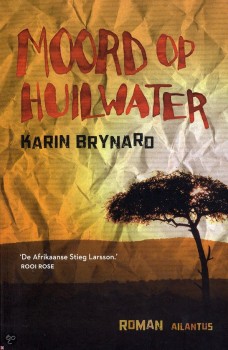 I particularly enjoyed writing Dam de Kock, Freddie’s mysterious farm manager. I still think about him a lot – although he hasn’t featured in any of the new books.
I particularly enjoyed writing Dam de Kock, Freddie’s mysterious farm manager. I still think about him a lot – although he hasn’t featured in any of the new books.
Dam grew out of a very soft place in my heart. That’s why I made him a gentle person with a deep understanding of nature, a love for the veld. He also rescues and tames wild raptors and cultivates roses. Apart from being a veld person, he is also very sophisticated, well educated (he reads poetry) and well traveled. A truly modern South African with deep roots in the formation of our country, being a descendant of both the San and Griquas (San, our true First Nation and the Griqua, who came from the early mixing of European settlers, the slaves of eastern descent and Khoi peoples.)
Another character I loved is Boet Pretorius. He is the personification of a lot of men, particularly white men, in this day and age. They work very hard to get ahead, but they often are capable of harsh violence and deep seated emotional shortcomings. And when they fall, they fall hard.
Now that we have an idea of the mystery and the characters, I’d like to go back to this question of the land. The reader feels the harshness and the beauty of the Kalahari, and also begins to understand the tragedy of the history of this particular area, of a “land soaked in blood”. As Afrikaner, do you feel affinity to the land? Was it the journalist in you or the Afrikaner in you that wanted to explore the story of the land? Can you describe some of the inter-connections between the characters and the land and the ‘land issues’ that motivate their behavior?
Wow, quite a loaded question.
I used the land issue as convenient ‘red herring’ in the uncovering of a murderer—ranging from historical land restitution to inheritance and plain and simple modern greed.
Land ownership has always been a central issue in our political debate, but I believe it will become even more so in the future. This interests me both as former political journalist and as member of the Afrikaans speaking community—who are called ‘boere’ in derogatory terms and have become the face of historical land dispossession.
At the moment the debate about land displacement in SA is dominated by the voice of the majority. But I wanted to also give voice to forgotten minorities like the San and Khoi particularly the Griqua, people whose histories of dispossession go back even further.
We all have an affinity to the land, whether we’ve been here ten or ten thousand years. The different characters have different connections to the land, as you mention. Dam de Kock, whose great-great grandfather dispossessed some San tribes (the Bergenaars and Korrannas) rejects the will of an Afrikaner land owner who bequeaths land to him. There is also the Afrikaner right winger, Buks Hanekom, who wants to start an armed revolt because he believes Afrikaners are forced off the land by ‘genocide’.
Even Freddie, in her desire to restore dignity to those who have been dispossessed of their land, gets caught up in ‘land rights’ and decides to help the locals with a land claim. This is a strong thread in the story and highlights a particularly South African problem. Can you comment on the underlying racial tensions this leads to?
It wouldn’t be a truly South African story without reference to race. We have been one of the last countries of the world where racism was formally scrapped from law and declared as a crime against humanity. So it would be almost impossible not to have it play a part. In my story the farm manager Dam (a man of mixed Griqua and San descent) comes naturally under suspicion because of race. The right wing farmer-group in the story are openly racist, while Inspector Beeslaar initially feels himself a victim of his race (a white skin), but towards the end of the story he has to confront the covert racism he harbours himself. There’s also assumptions about ethnic superstition (the baboon murder) and women accused of being witches.
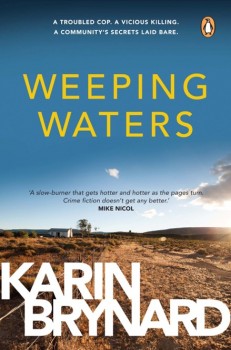 But once again I used race and prejudice to enhance the suspense and to provide more (mis)leading motives for murder.
But once again I used race and prejudice to enhance the suspense and to provide more (mis)leading motives for murder.
I don’t think we have fully dealt with the issue of racial and cultural prejudice—not only in South Africa, but throughout the rest of the world. Every society still grapples with racism, getting to understand the full extent of it and the full extent of the damage it does to both victims and perpetrators. One has only to look at the present riots in the US, the immigrations debates in Europe and Africa to get confirmation of this.
And along with victimhood go feelings of guilt. In our case, white guilt in the character of Freddie and her concern with the history of the Griqua people and the plight of neglected children from poor farming folk in the vicinity—to the extent that she adopts a child with Fetal Alcohol Syndrome. But ‘white guilt’ is not unique to SA—in Northern America there are whites fighting to restore land to descendants of the First Nations. But because the First Nations are now very small minorities these debates remain on the periphery of national politics.
I’d like to ask you about the translation. The title, WEEPING WATERS, is a translation of the name of the farm, Huilwater. Why not translate the title of the Afrikaans edition—PLAASMOORD—directly?
The idea for the title came from the Dutch translation, actually, which is “Moord op Huilwater”—murder on Weeping Waters.
And although the Afrikaans title is very strong, very loaded and direct it just doesn’t translate very well to English as Farm Murder. We felt that “Weeping Waters” would evoke more mystery and is better suited for a crime novel.
And why two translators? How did the process unfold?
I was very lucky to have a whole team of people working on the translation of the book into English. Maya Fowler, an award winning writer and Isobel Dixon, an accomplished poet (and very successful literary agent) combined their talents in doing the translation. This process was rounded off by the excellent Linda Gilfyllan as final editor. It was important to have the best possible translation as this was the basis for translation into other languages.
In your opinion, did the book lose or gain in translation?
A book actually becomes something new in translation, I think. There is an earthiness and rawness in Afrikaans and especially Griqua Afrikaans that is difficult to put across in Queen’s English. But South African English does it very well, conveys the atmosphere and grittiness required for typically SA settings. Both Maya and Isobel have deep roots in rural (and Afrikaans) South Africa. They’re both from Graaff Reinet in the Groot Karoo.
Afrikaans is easily translatable, because it’s a fairly simple language. But there’s a big difference between a technical translation and a literary one. And I’m so pleased with the atmospheric and beautiful prose created by Isobel, Maya and Linda in this book.
Does the inclusion of Afrikaans, and the odd Tswana word, hinder, or enhance, the reading experience?
If it’s a good story, it will translate, generally. The same way that German, French, Swedish, Nigerian or Japanese stories do. WEEPING WATERS has been successfully translated into Dutch and will also be published in German and French. No problem.
What’s next on the agenda?
I’m finishing a third Beeslaar crime novel.
Can’t wait to read the titles in English! Thanks, Karin, for a fascinating interview.
*****
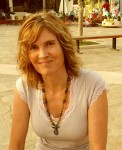 Joanne Hichens is an author, editor, blogger, and a teacher of creative writing. She is currently taking a break from teaching to complete a PhD at the University of the Witwatersrand (WITS). She is the author of DIVINE JUSTICE, a Rae Valentine thriller, which will be followed by SWEET PARADISE to be published in 2015. She has edited several collections of short stories, including the BED BOOK OF SHORT STORIES – a collection of writing by African women, and BAD COMPANY – a collection of south African crime-thriller fiction. She is curator of the SHORT SHARPS STORIES AWARDS, which is an initiative backed by the National Arts Festival to encourage the writing of South African fiction. The inaugural collection, BLOODY SATISFIED, a crime-fiction collection, was published 2013, followed by ADULTS ONLY – stories of love, lust, sex and sensuality, in 2014. INCREDIBLE JOURNEY will be published 2015. Joanne believes in promoting South African fiction in order to entrench a reading and writing culture.
Joanne Hichens is an author, editor, blogger, and a teacher of creative writing. She is currently taking a break from teaching to complete a PhD at the University of the Witwatersrand (WITS). She is the author of DIVINE JUSTICE, a Rae Valentine thriller, which will be followed by SWEET PARADISE to be published in 2015. She has edited several collections of short stories, including the BED BOOK OF SHORT STORIES – a collection of writing by African women, and BAD COMPANY – a collection of south African crime-thriller fiction. She is curator of the SHORT SHARPS STORIES AWARDS, which is an initiative backed by the National Arts Festival to encourage the writing of South African fiction. The inaugural collection, BLOODY SATISFIED, a crime-fiction collection, was published 2013, followed by ADULTS ONLY – stories of love, lust, sex and sensuality, in 2014. INCREDIBLE JOURNEY will be published 2015. Joanne believes in promoting South African fiction in order to entrench a reading and writing culture.
- AudioFile Spotlight: March Mystery and Suspense Audiobooks - March 17, 2025
- Africa Scene: Shadow City by Natalie Conyer - March 17, 2025
- The Ballad of the Great Value Boys by Ken Harris - February 15, 2025

